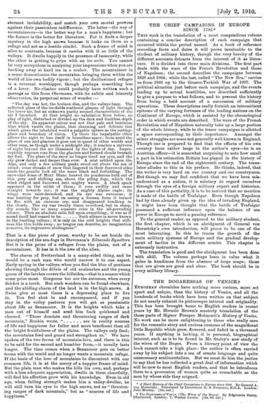THE CHIEF CAMPAIGNS IN EUROPE SINCE 1792.*
THIS work is the translation of a most compendious volume containing a concise description of each campaign that occurred within the period named. As a book of reference recording facts and dates it will prove invaluable to the student of military history, though the very brevity of the different accounts detracts from the interest of it as litera- ture. It is divided into three main divisions. The first part deals with the wars of the French Revolution and those of Napoleon ; the second describes the campaigns between 1828 and 1864; while the last, called " The New Era," carries us from 1866 up to the Graeco-Turkish War of 1897. The political situation just before each campaign, and the events leading up to actual hostilities, are described sufficiently to give a purpose to what follows, and to prevent the history from being a bald account of a succession of military operations. These descriptions really furnish an intermittent epitome of the varying fortunes of the leading nations on the Continent of Europe, which is assisted by the chronological order in which events are described. The wars of the French Revolution and of Napoleon naturally take up a large portion of the whole history, while to the lesser campaigns is allotted a space corresponding to their importance. Amongst the minor struggles are some not generally well known in England. Though one is prepared to find that the efforts of his own country loom rather large in the author's eyes—be is an Austrian officer—it is somewhat surprising to note how small a part in his estimation Britain has played in the history of Europe since the end of the eighteenth century. The trans- lator alludes to this in his preface. He thinks, indeed, that the writer is very hard on, our country and our countrymen. But though we may feel confident that we have been mis- understood as a nation, it is salutary to regard ourselves through the eyes of a foreign military expert and historian. As a case of this partiality, it is to be noticed that no mention is made of the battle of Trafalgar. Even though Napoleon had by then already given up the idea of invading England, it might have been thought that the battle of Trafalgar possessed a sufficient influence upon the balance of sea power in Europe to merit a passing reference.
To the general reader, as opposed to the military student, the first chapter, which is an abridgment of General von Horsetzky's own introduction, will prove to be one of the most interesting. In this he traces the growth of the main military systems of Europe and the gradual develop- ment of tactics in the different armies. This chapter is extremely instructive.
The translation is good and the abridgment has been done with skill. The volume perhaps loses in value what it gains in handiness from the absence- of large maps; those that are given are good and clear. The book should be in every military library.


















































 Previous page
Previous page